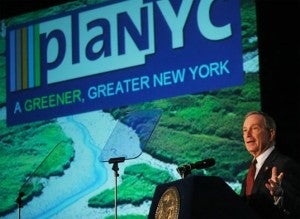Dramatically Cleaner Air Within Reach For New York City

At a standing-room-only speech in Harlem yesterday, Mayor Bloomberg launched the update to New York City’s sustainability initiative PlaNYC. That plan has two bold goals: achieving the cleanest air of any big city in America and cutting greenhouse gas emissions 30% by 2030.
I’m thrilled that the Mayor announced a dramatic step forward for clean air. The Clean Heat Campaign will phase out New York City’s most polluting heating fuels – heating oil no. 6 and no. 4 – through a combination of clear deadlines and a campaign to encourage buildings to upgrade to cleaner fuels and efficiency.
The stakes for public health are high. About 10,000 buildings burn heating oil so dirty that it causes more soot pollution than all of the cars and trucks in New York City combined. The new regulation finalized yesterday will eliminate the dirtiest of the fuels, number 6 oil, by 2015 and the next-dirtiest grade by 2030.
We think the health and business case for upgrading to clean heat is so compelling that these deadlines can be beat. To get information into the market, EDF launched a web page that maps the buildings in the city burning dirty oil, provides a step-by-step guide to upgrading to clean fuels, identifies incentives, and tells success stories from individual buildings. We’re committed to do what we can to make the transition to clean fuels as quick and affordable as possible.
Though clean heat got a lot of well-deserved media attention, PlaNYC includes other big steps forward:
– Commitments to clean energy, including one to “develop a smarter and cleaner electric utility grid for New York
City” – an idea that we think holds real promise to help expand the market for solar, efficiency and other clean energy sources;
– A new energy efficiency finance non-profit, using federal stimulus dollars to make local loans; and
– For the first time, the plan addresses food, recycling, and solid waste.
Around the world, cities are struggling with soot, smog, and climate impacts from how we make and use energy. Just two years ago, the planet’s population switched from primarily rural to more than 50% urban – by 2030, nearly 5 billion people (60% of the world’s population) will be living in cities. How those cities make and use energy will define our planet’s ability to solve climate change – and will dramatically affect public health. Today, with this announcement, I see hope for the future.











